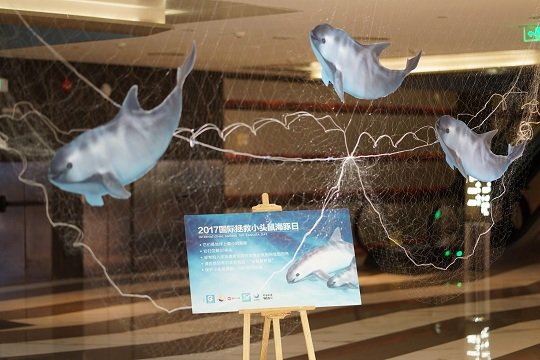 “八小时海洋电影院”——2017国际拯救小头鼠海豚日 ©WildAid
“八小时海洋电影院”——2017国际拯救小头鼠海豚日 ©WildAid
2017年7月8日是国际拯救小头鼠海豚日。五家广东当地的海洋保护组织与国际环保公益组织自然资源保护协会(NRDC)和野生救援(WildAid)一起组织了一场“八小时海洋电影院”的活动。观影活动通过播放纪录片呼吁大家关注濒危的小头鼠海豚以及其他海洋保护相关议题。为什么要保护小头鼠海豚?为什么要设立国际拯救小头鼠海豚日?
小头鼠海豚的故事
小头鼠海豚是墨西哥加利福尼亚湾的特有物种,也是世界上最小最濒危的鲸豚类哺乳动物。据国际小头鼠海豚种群恢复委员会最新数据,小头鼠海豚仅存22只。为保护这个濒危的物种,必须加强打击流刺网捕捞及非法石首鱼贸易。
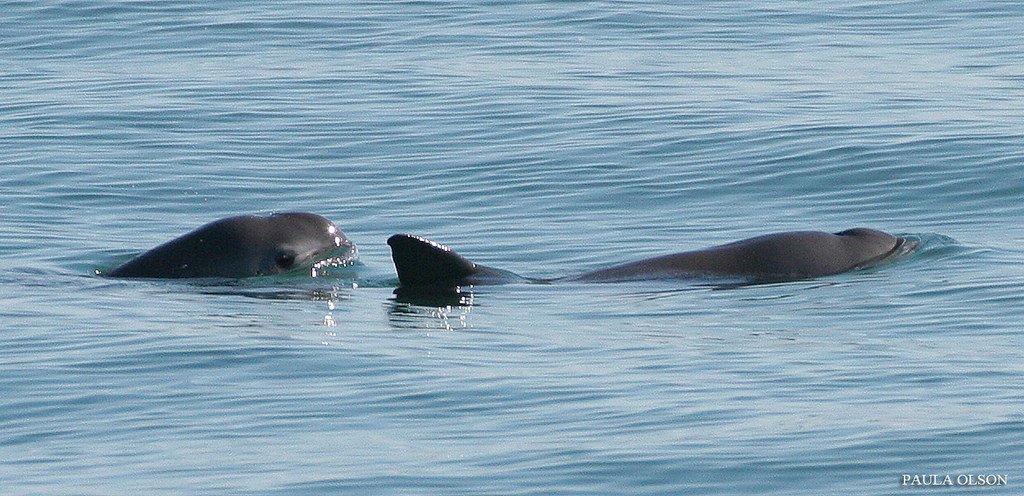 小头鼠海豚 ©NOAA/Paula Olson
小头鼠海豚 ©NOAA/Paula Olson
小头鼠海豚濒危的前因后果早已被注意到并记录下来,专家们一直在发出警告。小头鼠海豚和加湾石首鱼(也是墨西哥加利福尼亚湾的特有物种)因受非法捕捞、走私贩运及栖息地退化等威胁,种群数量持续减少,面临灭绝风险。当地渔民大量捕虾供应美国市场,其捕虾使用的流刺网导致石首鱼和小头鼠海豚的种群数量持续减少。早在1977年,加湾石首鱼和小头鼠海豚就被列为《濒危野生动植物物种国际贸易公约》(CITES)附录I物种,严格禁止商业性捕捞和国际贸易。近年来,石首鱼的非法捕捞使得形势变得更为严峻。一条石首鱼的售价相当于一个墨西哥渔民一年的收入,一些人因此铤而走险。
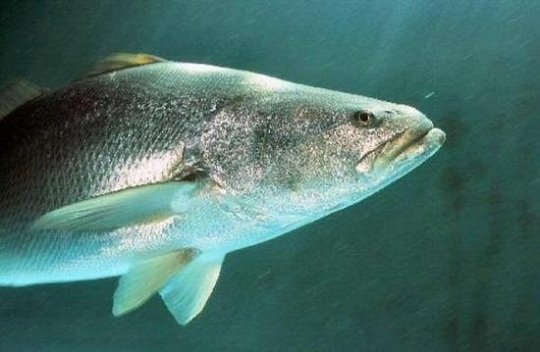 加利福尼亚湾石首鱼 ©墨西哥环境保护署
加利福尼亚湾石首鱼 ©墨西哥环境保护署
2010年以来,由于对石首鱼鳔 的需求暴涨导致非法捕捞爆发,对小头鼠海豚的误捕威胁也大为增加。在中国南方个别地区,干制黄唇鱼鱼鳔被认为是最贵、最好的花胶。在国家禁止黄唇鱼商业性捕捞后,当地人就把干制加湾石首鱼鳔作为其替代品,即金钱鳘鱼胶。这些鱼鳔是墨西哥的非法捕捞所得,经由墨西哥和美国走私进入中国和亚洲其他国家。
如今,墨西哥渔民捕虾时使用的流刺网仍旧是导致作为兼捕的加湾石首鱼和小头鼠海豚种群数量持续减少的主要原因之一。但是他们并不愿意负起责任。他们指责加湾石首鱼的非法贸易才是导致小头鼠海豚濒临灭绝的罪魁祸首。另外,尽管从事墨西哥虾贸易的美国进口商声称要坚持“可持续发展”,他们却并没有严格要求渔产品禁用流刺网捕捞以真正地推动“可持续发展”。
墨西哥、美国和中国必须联手推动保护小头鼠海豚这一独特且濒危的海洋哺乳动物。好消息是,2016年10月,在《濒危野生动植物种国际贸易公约》第十七次缔约国会议上,中美墨共同推动通过了加湾石首鱼保护决议。而就在上个月,墨西哥政府发布禁令,永久禁止流刺网捕捞,以期保护小头鼠海豚。
保护行动刻不容缓
墨西哥:流刺网禁令
两年前,墨西哥总统培尼亚·涅托发布复育小头鼠海豚的整体策略,鼓励开展保护小头鼠海豚的地方行动。然而,非法捕捞业依旧威胁着小头鼠海豚的生存。墨西哥需要继续在实施与落实现有渔业规章和流刺网禁令的基础上推行更多有效的措施。
美国:进口禁令
2017年2月,在NRDC的支持下,美国加州的一名议员在州立法机构例会上递交法案,提出加州应禁止进口任何在小头鼠海豚分布海域用流刺网捕捞的虾和其他渔产品。加州是进口墨西哥捕捞虾的主要地区以及非法石首鱼鱼鳔的主要中转站。一旦该法案生效,将永久性地禁止流刺网捕捞的虾和其他渔产品进入加州。
之后,NRDC与生物多样中心、动物福利研究所共同向美国政府提交了请愿书,呼吁禁止进口捕捞活动会对小头鼠海豚造成威胁的鱼类和渔产。我们希望这一禁令将会推动渔业捕捞停止使用流刺网——导致小头鼠海豚数量锐减的主要原因之一。
中国:宣传与执法
2016年12月,中国率先响应《濒危野生动植物种国际贸易公约》(CITES)2016年缔约国大会上关于加湾石首鱼走私的相关决议,多部门联手为打击加湾石首鱼走私举办了一场执法培训研讨会,为一线执法人员提供物种走私及市场执法制品辨别技术培训,启动了中美墨三国的合作。来自美国鱼类及野生动物管理局的执法代表、墨西哥环境保护署的执法代表以及中国香港特别行政区CITES执法部门及海关的工作人员参加了会议并分享了加湾石首鱼的非法贸易和执法情况。另外,会上还发布了手机适用的加湾石首鱼鳔快速视觉鉴定电子指南。
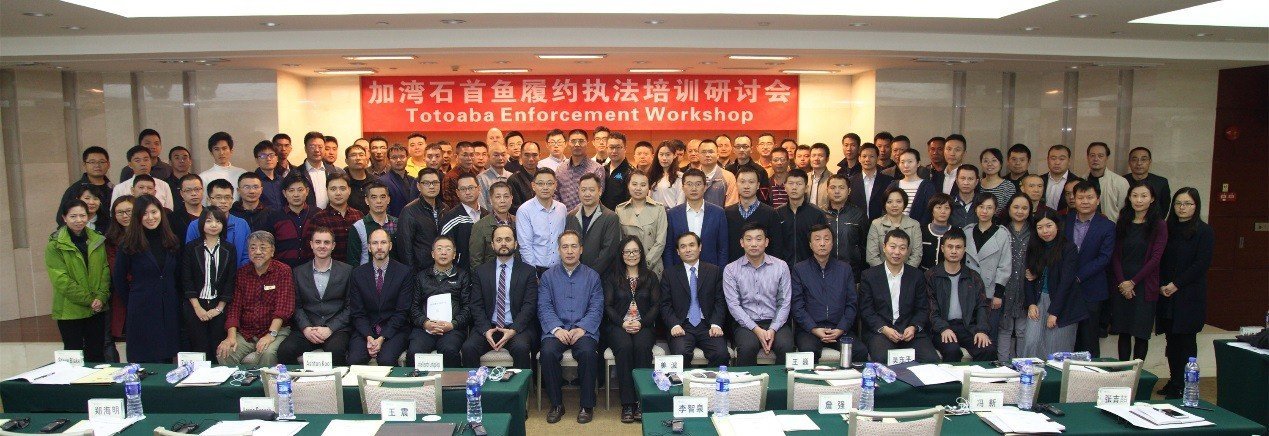 加湾石首鱼履约执法培训研讨会(2016年12月) ©NRDC
加湾石首鱼履约执法培训研讨会(2016年12月) ©NRDC
2017年1月,中国在广东省举办了为期一个月的针对非法经营利用黄唇鱼及加湾石首鱼鱼鳔的市场清查与宣传教育活动。这次行动主要聚焦于广州、深圳和汕头的干货水产市场、鱼市场、零售店、酒店和餐馆。春节前夕也是消费者购买加湾石首鱼鱼鳔作为年节礼品的主要时段。此次行动由国家农业部渔业局、国家工商管理总局市场司和国家濒危物种进出口管理办公室联合举办。当地海鲜市场协会、海鲜市场,以及中国大型电商公司阿里巴巴和腾讯均参加了此次活动,共同打击石首鱼的非法贸易及提升商家和消费者的守法意识。
这也是中国针对非中国原产的CITES非附录物种所开展的第一个多部门联合执法活动,表明了中国打击加湾石首鱼鱼鳔非法贸易的坚定立场。中国开展的持续的打私行动,也增强了其与墨西哥和美国的合作,以加大在整个贸易链条上对石首鱼保护的力度。
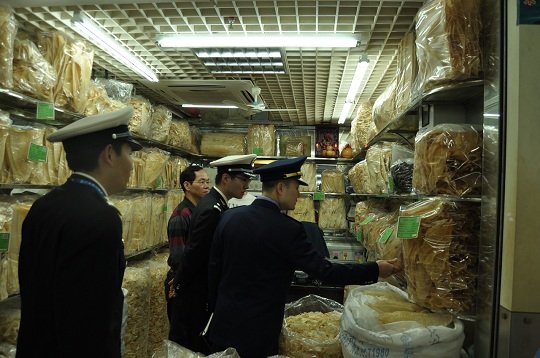 打击非法经营利用黄唇鱼及加利福尼亚湾石首鱼专项执法行动(2017年1月) ©NRDC/WildAid
打击非法经营利用黄唇鱼及加利福尼亚湾石首鱼专项执法行动(2017年1月) ©NRDC/WildAid
尽管干制石首鱼鱼鳔价格不菲,仍有一小批中国人在中国进行买卖。愈发严格的监管使得该非法贸易转为地下活动,加大了执法的难度。这也进一步说明了中美墨三国联手在执法上合作开展情报主导的调查以及控制下交付行动的重要性。
今年八月中美墨三国将在墨西哥再次会晤,就在整个贸易链中的执法协作进行进一步的探讨。如今,世界上仅存22只小头鼠海豚,每一个行动对其生死存亡都至关重要。NRDC赞赏中国在打击石首鱼非法贸易上做出的表率作用和采取的行动,也很高兴地看到美国在立法和公众宣传上所作出的努力。我们希望墨西哥作为小头鼠海豚的唯一分布国,能够加大源头保护和中转监管的活动力度,切实落实禁网令,推动小头鼠海豚种群的恢复。


